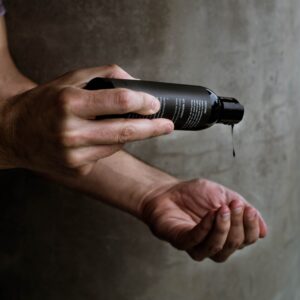There’s a connection between black hair relaxers and women's risk for getting fibroids. In reality, black women develop these non-cancerous uterine tumors at rates far higher than women of any other racial group. (They're three times more likely to be impacted, to be precise.) Even worse? Their fibroids form fibroids at an earlier age. Because, while most white women's diagnoses come in their thirties, black women often start dealing with fibroids in their twenties.
Plus, when they develop fibroids, black women’s symptoms tend to be worse. That leaves them facing heavy periods—and anemia—along with terrible pelvic discomfort and painful sex. Unfortunately, while we know how fibroids disproportionately affect women of color, we don’t know why. What we do have, though, are some potential links to this increased risk. And one of those links relates to how black women style their hair.

For years, we’ve known that some hair care products can be damaging to our health. Specifically, the Silent Spring Institute warned that hair products crafted for black women are packed with harmful chemicals, giving them an awful smell that reeks of poison.
In 2012, an American Journal of Epidemiology study linked fibroid risk and hair relaxer use. By 2017, a Rutgers University study had also linked Black women's hair relaxer use to an increased risk for breast cancer. As such, the Hair and Scalp Clinic’s Shirley McDonald says, "We now know that many hair products contain chemicals that are considered carcinogenic and/or hormone disrupters, leading to increased risk of medical issues such as fibroids." She even added that these products could be linked to alopecia—an auto-immune disease that causes hair loss.
After an eight-year study, the National Institutes of Health explored the link between hair relaxers and breast cancer for 46,000 women between the ages of 35–74. While study participants represented all races, African American participants had a 45% greater risk for breast cancer, suggesting that black hair relaxers could be part of the problem.
Another recent development? An American Journal of Epidemiology study followed 23,000 Black women who still had regular menstrual cycles. Even younger women had a dramatically higher rate of uterine fibroids, causing one researcher to suggest the higher risk was related to their hair relaxer exposure. With increasing evidence that fibroid may cause breast cancer, the potential dangers of these products cannot be ignored.
Don’t think that’s all the bad news: the National Institute of Environmental Health Sciences’ (NIEHS) Sister Study also concluded that black hair relaxers increase the risk for uterine cancer. Alexandra White, the head of NIEHS, explained, “We estimated that 1.64% of women who never used hair straighteners would go on to develop uterine cancer by the age of 70. But for frequent users, that risk goes up to 4.05%. This doubling rate is concerning."
Fortunately, women are starting to wake up to the risks of their hair products—and they’re ready to fight back against unscrupulous manufacturers! In California, Rugieyatu Bhonopha filed a lawsuit against L’Oreal alleging that the chemicals in their hair straightening products played a role in her fibroids diagnosis. We wish her luck in pursuit of justice, and hope that other women will hear about her case and avoid using dangerous black hair relaxers!
And she's not alone. The FDA is now proposing a ban on all hair straighteners containing formaldehyde. Set to take effect in April 2024, the law is being considered due to links with increased risk for cancer and other serious health concerns!.
Now that you know these products contain dangerous chemicals, allow us to introduce them to you. The hit-list includes cyclosiloxanes, nonylphenols and phthalates. (If that sounds familiar, it’s because they’re the reason why many people are moving to place a ban on plastic food containers.) These products can also be infused with formaldehyde, Di-2-ethylhexylphthalate (DEHP), parabens and volatile organic compounds (VOCs). And guess what? In addition to being toxic, all of these chemicals are also known hormone disruptors, capable of increasing your risk for fibroids, infertility, asthma and certain types of cancer.
Even without exposure to black hair relaxers, African American women are at an elevated risk for fibroid development. Again, we aren’t sure why, but higher obesity rates and family history both seem to be part of the problem.
Even so, the Silent Spring institute wants to place a large portion of blame on Black hair products, because they contain "endocrine-disrupting and asthma-causing chemicals." And it’s not just hair relaxers that you have to watch out for: these chemicals make their way into hot oil treatments, leave-in conditioner and frizz-fighting balms. Frighteningly, products marketed to children contained the highest chemical content, leading to their outright ban in the European Union.
Fibroids are non-cancerous growths. But we can also link hair relaxers to an increased risk for breast cancer (as we mentioned earlier.) And new evidence from the Boston University's Black Women's Health study confirms that, among 55,000 black women, those who used hair relaxers seven times a year or more were 30% more likely to develop breast cancer. Research also confirmed a link between hair product exposure and increased uterine cancer risk.
Family history can increase your risk for fibroids—but it doesn’t have to tell your whole story. Instead, be careful when choosing hair products, making sure to review them carefully using the Skin Deep database or the ThinkDirty app. You can also look at the Detox Me app, since it offers guidelines for purchasing better-for-you beauty products. Want to deal with existing fibroids, and reduce your risk for future growths? Contact the Dallas Fibroid Center and schedule a comprehensive consultation with our specialists.
Sources: Vox, NY Times parenting, Silent Spring Institute, NIH

Our Locations
Monday - Friday
8am - 5pm
Dallas
3920 W Wheatland Rd,
Suite 108,
Dallas, TX 75237
Plano
5425 W. Spring Creek Parkway,
Suite 100
Plano, TX 75024
Scheduling
Please contact our dedicated specialists to schedule a consultation today.
2025 Dallas Fibroid Center. All rights reserved. Website Design by Healthcare Success